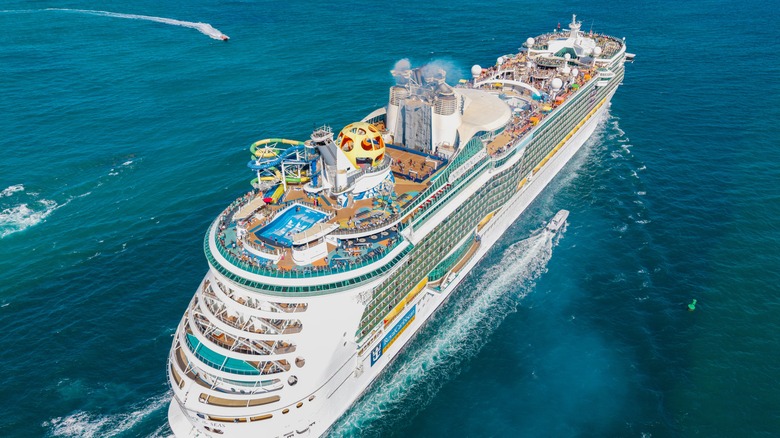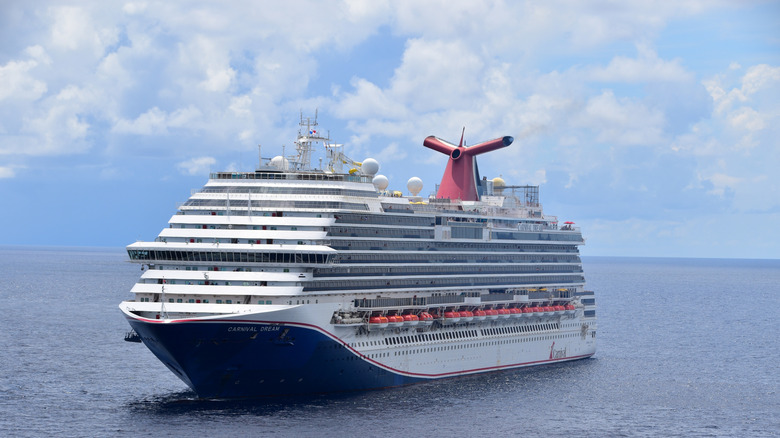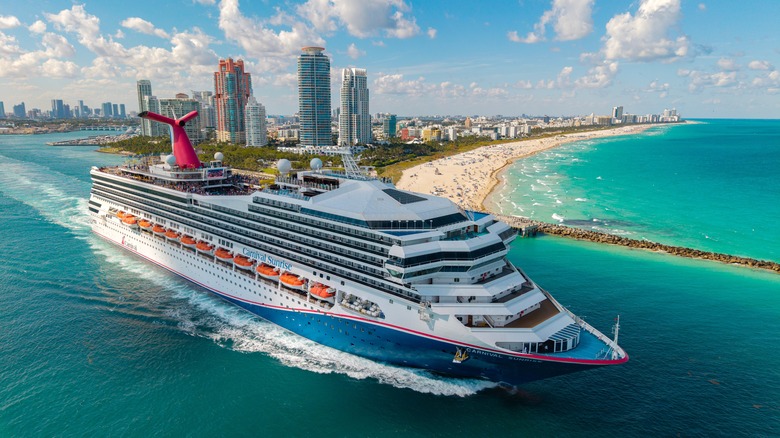How Many People Fall Off Cruise Ships Each Year?
Cruises have proven increasingly popular over the last decade, with a record 19 million Americans projected to take a seafaring vacation in 2025. That's the highest number ever, as companies expand their offerings to draw in crowds. From drinking and dining to swimming and sundecks, cruise companies promise to make sure your every whim is catered to on your journey to sought-after destinations like the Caribbean.
Cruise ships come with unique dangers, though, despite the safety measures that do exist. It's no surprise that tragedy sometimes strikes, and it most commonly takes the form of a fall overboard or onto a lower deck. Cruise ships are among the biggest ships the world has ever seen, so falling from one isn't like going overboard from a schooner or small yacht. From one of the upper decks, it's more like falling from the top of a high-rise apartment building.
Just how worried should you be about taking a high dive to an aquatic grave on your getaway around the Bahamas? Well, according to both the cruising industry and other research, you can breathe easy in that sea air. On average, fewer than 20 people fall overboard a year. Compared to the millions of passengers, that's a small fraction of a percent. Most of the time, the only thing going overboard is all the poop on a cruise ship. So, here's the data on how many people fall off cruise ships each year.
Few people fall off cruise ships each year , and even fewer survive
According to a 2020 report from the Cruise Lines International Association (CLIA), an industry trade group representing the interests of cruise lines and their stakeholders, an average of 19 people per year fell off cruise ships between 2009 to 2019. In total, 212 people were found to have experienced what the group refers to as a "man overboard incident." 170 of these 212 falls were fatal, so your chance of surviving a fall from the decks comes out to just under 20%. Passengers are the most likely to die, with only 53 of those 170 deaths involving crew members. However, since the CLIA represents cruise lines, this data should be treated with a pinch of salt.
However, falling overboard is only one of the ways people tend to die on cruise ships. In a 2020 paper published in the International Journal of Travel Medicine and Global Health, researchers noted 623 reported cruise ship deaths between 2000 and 2019, 89% of which were passenger deaths. Falls overboard or onto lower decks accounted for 23% of passenger fatalities, while a further 19% were the result of "suicide, murder, and a terror attack."
To put things in perspective, 53 million Americans alone went on cruises in the four years from 2016 to 2019, and this study covered a 19-year period. So, although tragedy can strike on a cruise, it's extremely unlikely. Moreover, falls overboard are often associated with overconsumption of alcohol or simply poor judgment. Slip-and-falls overboard are rare thanks to safety measures like railings. High-tech overboard detection systems are also being implemented more widely.
Cruise lines face little liability for deaths onboard
Those who have lost loved ones while on a cruise have discovered how difficult it can be to seek restitution. Because cruise ships operate in international waters, they are not subject to the laws of any port at which they dock. Instead, deaths fall under a 1920 maritime law called the Death on the High Seas Act (DOHSA). Whereas the family of someone who died on land might be able to collect for emotional and economic damages, DOHSA limits liability for deaths aboard ocean-going vessels that are three nautical miles or more away from the coast.
In the event a cruise line can be held accountable for a death, which is not a given, only pecuniary damages are required. In addition to funeral costs, the deceased's projected lifetime income is calculated and paid out. In practice, that means no damages are paid when the deceased is a child or a retiree, since they had no income to calculate. If the body cannot be recovered, funeral costs are reduced as well.
In 2009, John Kerry, then a senator for Massachusetts, introduced legislation to improve cruise ship safety, which included a provision to reform DOHSA. The cruise industry fought back, spending $2.2 million to fight the law. Ultimately, the provision was struck from the bill. In 2017, another effort was made to amend DOHSA with a bill titled the Cruise Passenger Protection Act. The bill failed to receive a vote. A similar fate befell the proposed Hammer's Law in 2023, named after the victim of a cruise ship death.


